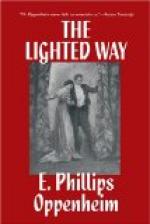Mr. Jarvis, however, did not understand it. He could conceive of no spot in the city of London, or its immediate neighborhood, where Mr. Samuel Weatherley, head of the firm of Messrs. Weatherley & Co., could find himself among his social superiors. He knew the capital of the firm, and its status. He was ignorant of the other things which counted—as ignorant as his master had been until he had paid a business visit a few years ago, in search of certain edibles, to an island in the Mediterranean Sea. He was to have returned in triumph to Tooley Street and launched upon the provision-buying world a new cheese of astounding quality and infinitesimal price—instead of which he brought home a wife.
“Anything I can do, sir,” began Mr. Jarvis, a little vaguely,—
“My idea was,” Mr. Weatherley proceeded, “that one of my own young men—there are twelve of them in there, aren’t there?” he added, jerking his head in the direction of the office—“might do. What do you think?”
Mr. Jarvis nodded thoughtfully.
“It would be a great honor, sir,” he declared, “a very great honor indeed.”
Mr. Weatherley did not contradict him. As a matter of fact, he was of the same opinion.
“The question is which,” he continued.
Mr. Jarvis began to understand why he had been consulted. His fingers involuntarily straightened his tie.
“If I could be of any use personally, sir,—”
His employer shook his head.
“My wife would expect me to bring a single man, Jarvis,” he said, “and besides, I don’t suppose you play bridge.”
“Cards are not much in my line,” Mr. Jarvis admitted, “not having, as a rule, the time to spare, but I can take a hand at loo, if desired.”
“My wife’s friends all play bridge,” Mr. Weatherley declared, a little brusquely. “There’s only one young man in the office, Jarvis, who, from his appearance, struck me as being likely.”
“Mr. Stephen Tidey, of course, sir,” the confidential clerk agreed. “Most suitable thing, sir, and I’m sure his father would accept it as a high compliment. Mr. Stephen Tidey Senior, sir, as you may be aware, is next on the list for the shrievalty. Shall I call him out, sir?”
Mr. Weatherley looked through the glass and met the glance, instantly lowered, of the young man in question. Mr. Stephen Tidey Junior was short and stout, reflecting in his physique his aldermanic father. His complexion was poor, however, his neck thick, and he wore a necktie of red silk drawn through a diamond ring. There was nothing in his appearance which grated particularly upon Mr. Weatherley’s sense of seemliness. Nevertheless, he shook his head. He was beginning to recognize his wife’s point of view, even though it still seemed strange to him.
“I wasn’t thinking of young Tidey at all,” he declared, bluntly. “I was thinking of that young fellow at the end of the desk there—chap with a queer name—Chetwode, I think you call him.”




